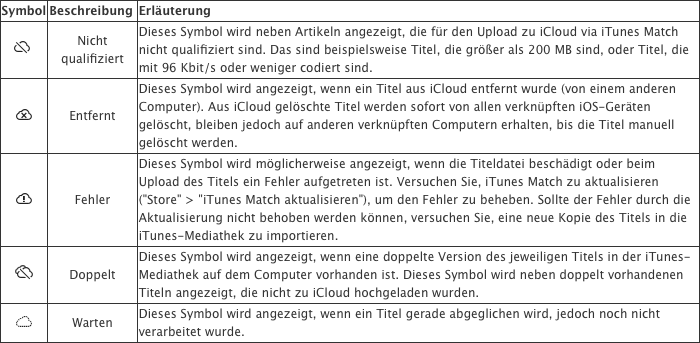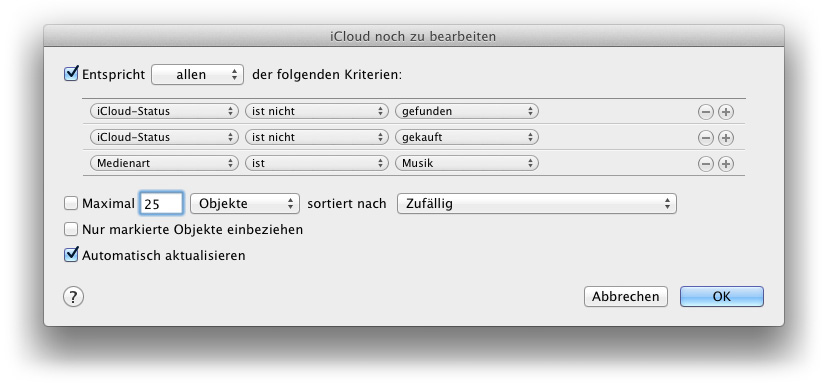
Willkommen in der Zukunft: all unsere Daten und Informationen liegen in einer Wolke — jederzeit erreichbar (nur durch mich?) — was für ein Luxus! iTunes Match macht hier einen großen Schritt in diese Zukunft. Nachdem die GEMA diesen Dienst auch in Deutschland erlaubt, können nun bis zu 10 Devices mit einem Account auf die private Musik-Wolke iCloud zugreifen und so ihre Medien gegenseitig synchronisieren. Die Idee gefällt mir und so habe ich die 25 Euro jährlich investiert und damit angefangen, auch meine Musik in die Wolke zu schieben…
Vorbereitung
iTunes Match funktioniert aktuell leider nur mit Musik und nicht mit Hörbüchern und Filmen, auch wenn diese im Apple iTunes Music Store selbst zu haben sind. Will man seine Bibliothek schrittwiese in die Wolke verschieben, sollte das Ziel darin bestehen, die eigenen Tracks von Apple finden zu lassen, damit die höhere Soundqualität des iTunes Music Stores (iTunes Plus 256 KBit/s M4A) in Zukunft herangezogen wird und so die Musikdateien, welche ursprünglich in einer schlechteren Qualität eingelesen wurden, aufwertet.
Zu aller erst ist es ratsam, ein Backup der iTunes-Bibliothek auf ein Backup-RAID-System durchzuführen. Meist steckt in solch einer iTunes-Bibliothek eine jahrelange Arbeit.
Damit man den Status der einzelnen Dateien genau erkennen kann, empfiehlt es sich zwei zusätzliche Spalten in iTunes einzublenden: “iCloud-Download” und “iCloud-Status”. Zusätzlich kann noch die Spalte “Datenrate” aktiviert werden um zu sehen, in welcher Qualität die lokale Datei vorliegt. In der Spalte “iCloud-Download” werden Wolken-Symbole angezeigt. Die genaue Bedeutung ist in der folgenden Grafik ersichtlich (Quelle: Apple):

Die Spalte “iCloud-Status” zeigt nochmals in Textform, wie iTunes Match die einzelne Datei handhabt. Dies vor allem auch, wenn keine Wolke in der Spalte “iCloud-Download” zu sehen ist, also die Datei entweder gefunden oder gekauft wurde und schon lokal vorliegt.
Jetzt empfehle ich eine automatisiert Playliste zu erstellen, in der alle Dateien aufgelistet werden, welche aus irgendeinem Grund nicht von Apples iTunes Match gefunden werden. Dies sind alle Titel, deren Status NICHT “gefunden” oder “gekauft” ist:
 Jetzt kann iTunes Match gekauft und aktiviert werden, dann startet iTunes mit der Analyse der Titel. Dabei werden Titel, die nicht im iTunes Store gefunden wurden in die iCloud hochgeladen, maximal jedoch nur 25000 Titel. Je nach DSL-Anbindung und Bibliotheksgröße kann dies einige Stunden dauern. Hier empfehle ich erst einmal mit einer kleinen Teilmenge der Bibliothek anzufangen.
Jetzt kann iTunes Match gekauft und aktiviert werden, dann startet iTunes mit der Analyse der Titel. Dabei werden Titel, die nicht im iTunes Store gefunden wurden in die iCloud hochgeladen, maximal jedoch nur 25000 Titel. Je nach DSL-Anbindung und Bibliotheksgröße kann dies einige Stunden dauern. Hier empfehle ich erst einmal mit einer kleinen Teilmenge der Bibliothek anzufangen.
Match, or no match…
… das ist hier die Frage! Ich musste feststellen, dass einige CDs nur zu einem gewissen Prozentsatz von iTunes Match als “gefunden” markiert wurden, auch wenn die CD mit all ihren Titeln so auch im iTunes Music Store zu haben ist. Woran liegt das?
Nach einigem Hin und Her ist mir aufgefallen, dass nicht unbedingt die Metadaten der Audiofiles für das Matching verantwortlich sind. Es wurden Tracks von Kompilations erkannt, die so nicht im iTunes Store erworben werden können, allerdings in einem anderen von Apple angebotenem Album ebenfalls vorkommen (allerdings wurde auch Tracks gefunden, die Apple überhaupt nicht anbietet!). Eine Recherché im Internet hat mir dies dann auch bestätigt: viel wichtiger schien es mir, dass ein Lied ungefähr die gleiche Länge wie im iTunes Music Store haben musste (bis zu 12 Sekunden Abweichung sind je nach Lied erlaubt). Dies erklärt sich dadurch, da iTunes einen Fingerprint des Audiospektrums errechnet, um diesen mit dem Backend abzugleichen. Hierbei schaut Apple nur die ersten 17 Sekunden eines Liedes an, wenn dann die Länge noch passt und ggf. einige Metadaten vorhanden sind, kann danach das Lied defekt sind, dies stört iTunes nicht (siehe auch Beitrag von heise.de) (UPDATE: inzwischen hat Apple den Erkennungsalgorithmus verändert, so dass wohl die gesamte Musik vorhanden sein muss). Die hierfür von Apple lizenzierte Technologie bezeichnet sich MusicID, welches auch für die Genius-Vorschläge herangenommen wird. Das Backend von MusicID wird durch die größte vorhandene Metadaten-Datenbank, geliefert durch GraceNote, unterstützt. Die Zuordnung anhand des Audiospektrum-Fingerabdrucks, ohne Bezug auf die Metadaten zu nehmen, vermeidet, dass ein falsch getaggtes Lied durch einen anderen Titel aus dem iTunes Music Store überschrieben wird. Apple ist dadurch unabhängig von den Metadaten und Covers der Audiofiles, was es einem ermöglicht, seine eigenen Namensgebungen, Genres und Grafiken in der iCloud einzusetzen.
Anders herum bedeutet dies aber auch, dass z.B. Live-Tracks oder Lieder mir kleinen Varianten von iTunes Match nicht erkannt und deswegen hochgeladen werden. Kommt es vor, dass das ein oder andere Lied einer CD nicht erkannt wird, sollte man als erstes die Länge vergleichen, um so festzustellen, ob hier nicht doch eine Variation vorliegt. Bei gleicher Länge, empfiehlt es sich, den Track nochmals neu einzulesen.
DRM-geschützte Lieder müssen notfalls auf eine virtuelle CD gebrannt und neu importiert werden, damit diese gematcht werden und somit DRM-frei werden. Für Mac OS X empfiehlt sich hierfür Virtual CD RW.
Hörbücher, Filme, Dateien über 200 MB oder in einer schlechten Qualität (< 96 kbps) werden nicht abgeglichen (wenn die Bitrate zu gering ist, einfach mal im iTunes in eine AAC Datei umwandeln und diese dann matchen lassen… das hilft manchmal).
Was in der iCloud liegt, bleibt dort!
Wurde ein Lied einmal hochgeladen, behält Apple diese Datei wohl auf seine Platten, auch wenn später das Lied in iTunes aus der iCloud wieder “gelöscht” wird. Das merkt man daran, dass aus der iCloud gelöschte Dateien, welche später wieder zur Bibliothek hinzugefügt werden, nicht nochmals hochgeladen werden, sondern gleich den Status “Übertragen” bekommen. Dies auch, wenn zwischen dem Löschen und dem neu Hinzufügen mehrere Synchronisationsvorgänge mit iTunes Match durchgeführt wurden.
iTunes Bibliothek gerade ziehen
Von Apple selber werden die Metadaten der Tracks beim Einlesen einer CD nicht geliefert. Hier wird der GraceNote-Service in iTunes herangezogen. Will man nachträglich die Song-Metadaten bearbeiten lassen oder vielleicht sogar Song-Texte automatisiert hinzufügen, helfen hier Tools wie SongGenie von Equinux oder MusicBrainz Picard, welche diesen Dienst wohl auch nutzen. Für das Auffinden passender Covers unterstützt einem das Tool CoverScout von Equinux. iTunes-Skripte helfen einem, um z.B. den Zähler für die Anzahl der Abspielungen zu korrigieren, falls durch das temporäre Entfernen eines Songs dieser verloren gingen (siehe Skripte aus dem iPodBuch).
JAN
